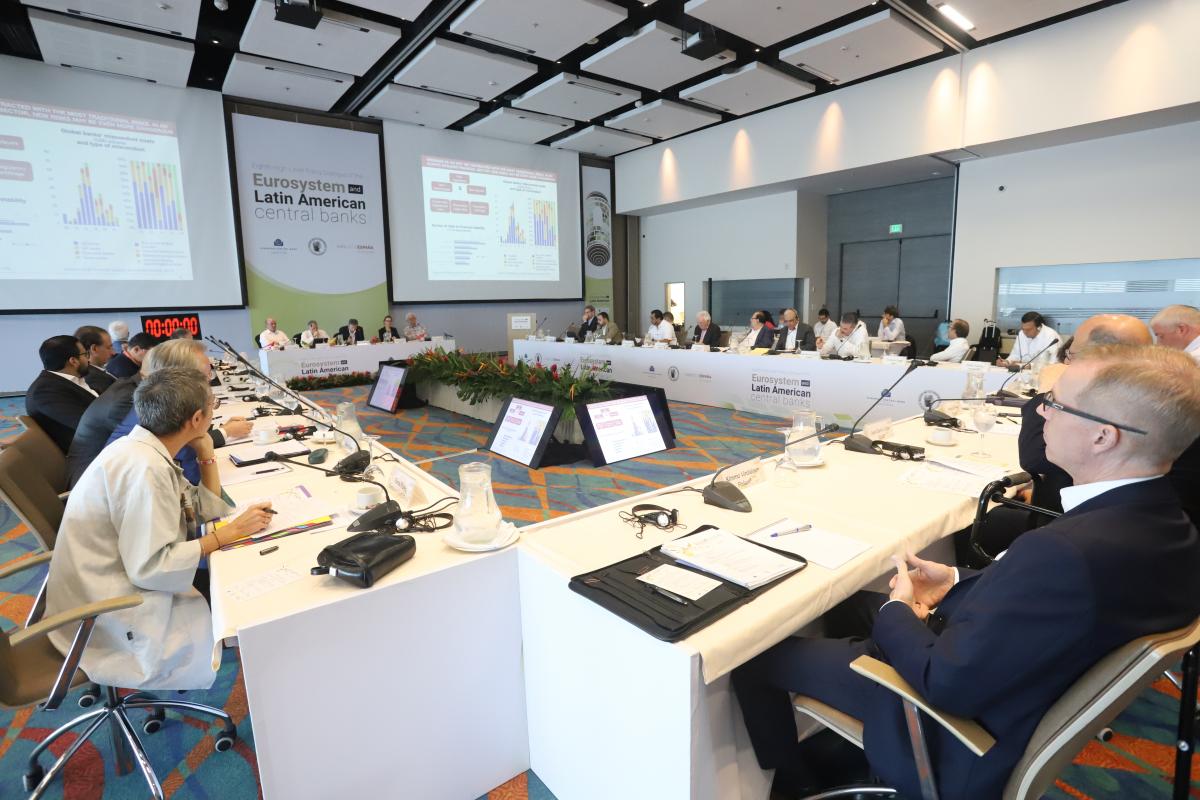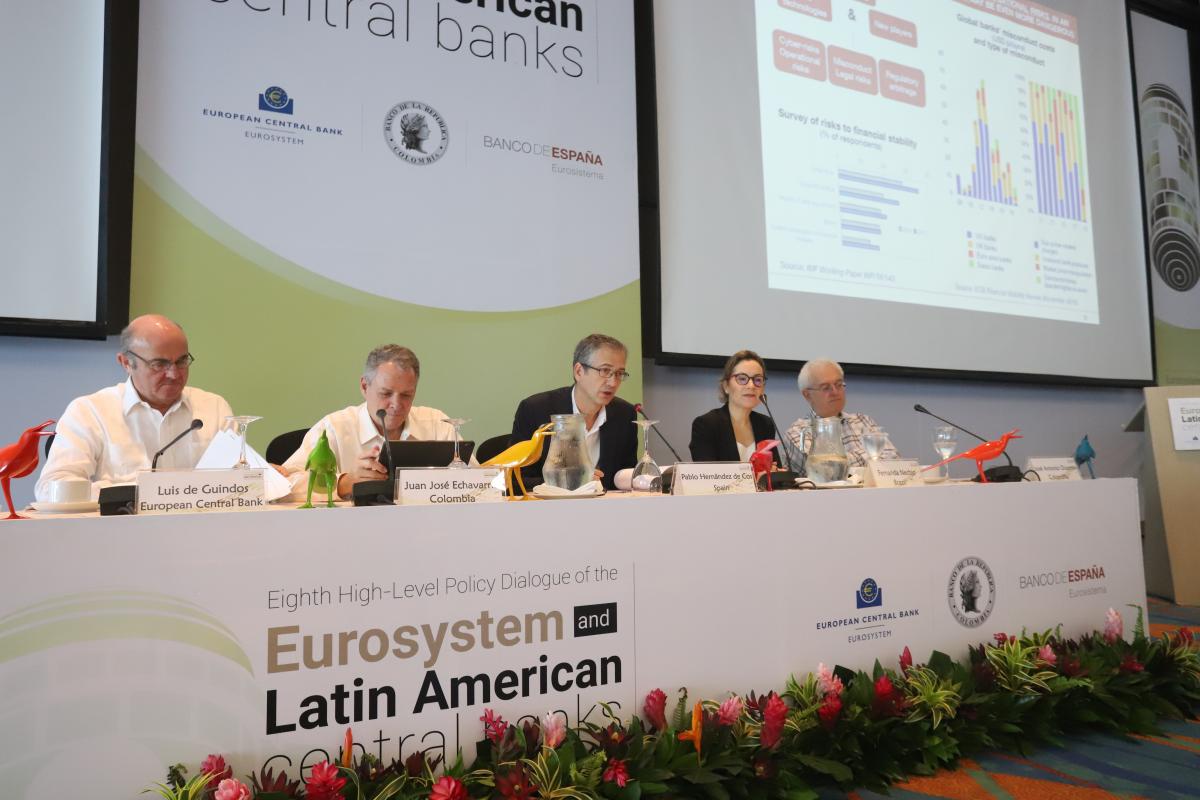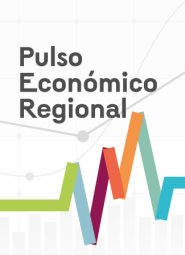Eighth High-Level Political Dialog between the Eurosystem and Latin American Central Banks
The Eighth high-Level Political Dialog between the Eurosystem and Latin American Central Banks took place on 28 and 29 November in Cartagena de Indias. The meeting was organized jointly by the European Central Bank, Banco de España, and Banco de la República de Colombia, which hosted the meeting.
This high-level dialog between central banks from Latin America and the Eurosystem has been taking place since 2002, and it presents an opportunity to discuss issues of interest and current affairs in central banking. Governors and representatives of twenty Latin American and Eurosystem central banks attended this year's meeting, together with representatives of other regional and international institutions such as the Center for Monetary and Financial Studies for Latin America (CEMLA), the Central American Monetary Council, the Latin American Reserve Fund (FLAR), the Bank for International Settlements (BIS), and the European Commission.
The sessions of the meeting focused on three main topics: (1) current challenges to promote growth and trade between Europe and Latin America; (2) governance of the international financial system; and (3) the instruments available to central banks to protect financial stability and the role of regional and global financial institutions.
In addition to the sessions devoted to each of these topics there was also a main session featuring Luiz Pereira da Silva, Assistant General Manager of the BIS, who spoke about the main challenges that central banks in advanced countries currently face regarding low inflation rates. In his speech, Pereira da Silva analyzed some alternatives by posed by economic authorities to face a low inflation and low growth scenario.
Also, a policy panel on the status of global financial stability was held. This panel highlighted the challenges and risks to the financial system imposed by new technological developments and the current macroeconomic context, as well as the role of unconventional monetary policy measures in boosting economic growth. Among the current risks to global financial stability, the following stand out: the readjustment in the prices of some financial assets; high indebtedness of the public and private sectors in some advanced economies; excessive risk-taking by the non-banking financial sector; and the weak financial performance of banks, particularly in the euro area. Similarly, policy measures to be implemented by the authorities to deal with these risks were discussed, including the following: monitoring the risks of the financial system; full implementation of the measures suggested by the Basel III agreement; strengthening macro-prudential and counter-cyclical policies; and the design of appropriate macro-prudential regulation and surveillance frameworks for the non-financial sector. As for emerging economies, volatility of capital flows was discussed as a challenge to macroeconomic stability.
Current challenges to promote growth and trade between Europe and Latin America
The current challenges to economic growth and trade were discussed in the first session, as well as the role and benefits of regional integration to address them from the perspectives of central banks in Europe and Latin America. Some of the current challenges include the recent uncertainty regarding the trade policies adopted by some advanced economies, increased protectionist measures, and the vulnerabilities of some emerging economies. This situation has affected potential growth and productivity in Europe, as well as investment. In Latin America, growth prospects remain weak, although some countries such as Mexico and Brazil may have benefited somehow from the US-China trade war. As discussed, further regional integration could help to improve living standards in the countries of both regions. Indeed, both regions have different initiatives to deepen their trade ties, such as the existing trade agreements between the European Union and Mercosur, Mexico, Colombia, and Chile. However, some of the challenges to secure the benefits of such integration include strengthening institutions, efficient allocation of resources to improve productivity in the medium and long term, and reducing inequality and informal economy.
Some of the topics discussed during this session were the central banks' vision of the policies needed to promote economic growth, productivity, and investment in Europe and Latin America, the relationship between the tight space of fiscal policy in some countries and infrastructure investment needs in both regions, and the effects caused by trade tensions in both regions.
Governance of the international monetary system
During the second session, participants discussed proposals from the expert group called Eminent persons Group contained in the report titled Making the Global Financial System Work for All[1]. The proposals presented in the report are grouped into three blocks: (1) achieving greater impact and sustainability of economic development through the coordinated work of global and regional financial institutions; (2) improving the resilience of the financial system through greater market integration; and (3) improving the governance and articulation of international financial institutions and other multilateral organizations in order to ensure their effectiveness.
The report emphasizes the importance of promoting the deepening and development of capital markets in emerging countries, while joining efforts to promote financial stability and address the issue of volatility in capital flows towards these regions. It also highlights the need to improve global financial surveillance through enhanced cooperation and coordination of roles among agencies such as the International Monetary Fund, the Financial Stability Board (FSB), and the Bank for International Settlements (BIS). It also highlights the importance of focusing the G20 agenda on strategic issues for global governance, in order to avoid duplication of work with other international financial institutions. During the discussion in this session, governors discussed their views on the main proposals, as well as the role of central banks and the challenges faced to implement these proposals.
Instruments available to central banks to preserve financial stability and the role of regional and global financial institutions.
During this session, the importance of regional cooperation to promote the soundness of the international financial system was discussed. Given the current uncertainty in financial markets, promoting resilience of the financial system is one of the monetary authorities’ major concerns. In this regard, the implementation of effective macroprudential policies and coordination among relevant authorities is vital to ensure regional financial stability. The panelists in this session shared their experiences implementing such measures and the role that central banks have played in policies that seek to strengthen the soundness of the financial system. Central banks not only contribute to financial stability through the development of policies and tools designed to prevent risks in the financial system; they also play an important role in strengthening the international financial architecture, for example, through their participation in the IMF. Similarly, the need to strengthen the regulatory framework was discussed, particularly regarding issues such as the implementation of Basel III standards and the regulation of the non-banking financial system.
[1]The The Eminent persons Group was established by G20 finance ministers and central bank governors in 2017, bringing together global experts in the field of governance and architecture of the international financial system. The objective of the report produced by this group of experts is to recommend proposals and reforms to improve the operation of the global financial system, thereby promoting greater global economic growth and development.































































